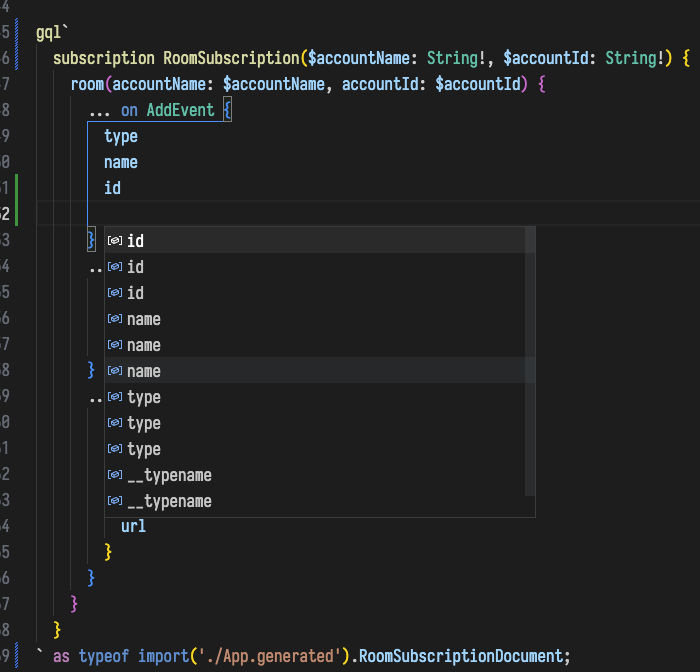This is a TypeScript LSP Plugin that will recognise documents in your TypeScript code and help you out with hover-information, diagnostics and auto-complete.
- Hover information showing the decriptions of fields
- Diagnostics for adding fields that don't exist, are deprecated, missmatched argument types, ...
- Auto-complete inside your editor for fields
- Will warn you when you are importing from a file that is exporting fragments that you're not using
Note that this plugin does not do syntax highlighting, for that you still need something like the VSCode/... plugin
npm install -D @0no-co/graphqlspGo to your tsconfig.json and add
{
"compilerOptions": {
"plugins": [
{
"name": "@0no-co/graphqlsp",
"schema": "./schema.graphql"
}
]
}
}now restart your TS-server and you should be good to go, ensure you are using the workspace version of TypeScript. In VSCode you can do so by clicking the bottom right when on a TypeScript file or adding a file like this.
If you are using VSCode ensure that your editor is using the Workspace Version of TypeScript this can be done by manually selecting it or adding a
.vscode/config.jsonwith the contents of{ "typescript.tsdk": "node_modules/typescript/lib", "typescript.enablePromptUseWorkspaceTsdk": true }
Required
schemaallows you to specify a url,.jsonor.graphqlfile as your schema. If you need to specify headers for your introspection you can opt into the object notation i.e.{ "schema": { "url": "x", "headers": { "Authorization": "y" } }}
Optional
templateadd an additional template to the defaultsgqlandgraphqltemplateIsCallExpressionthis tells our client that you are usinggraphql('doc')(default: true) when usingfalseit will look for tagged template literalsshouldCheckForColocatedFragmentswhen turned on, this will scan your imports to find unused fragments and provide a message notifying you about them (only works with call-expressions, default: true)trackFieldUsagethis only works with the client-preset, when turned on it will warn you about unused fields within the same file. (only works with call-expressions, default: true)tadaOutputLocationwhen usinggql.tadathis can be convenient as it automatically generates anintrospection.tsfile for you, just give it the directory to output to and you're donetadaDisablePreprocessingthis setting disables the optimisation oftadaOutputto a pre-processed TypeScript type, this is off by default.
Currently the tracking unused fields feature has a few caveats with regards to tracking, first and foremost it will only track the result and the accessed properties in the same file to encourage fragment co-location.
Secondly, we don't track mutations/subscriptions as some folks will add additional fields to properly support normalised cache updates.
When we use a useQuery that supports TypedDocumentNode it will automatically pick up the typings
from the query you provide it. However for fragments this could become a bit more troublesome, the
minimal way of providing typings for a fragment would be the following:
import { TypedDocumentNode } from '@graphql-typed-document-node/core';
export const PokemonFields = gql`
fragment pokemonFields on Pokemon {
id
name
}
` as typeof import('./Pokemon.generated').PokemonFieldsFragmentDoc;
export const Pokemon = props => {
const pokemon = useFragment(props.pokemon, PokemonFields);
};
export function useFragment<Type>(
data: any,
_fragment: TypedDocumentNode<Type>
): Type {
return data;
}This is mainly needed in cases where this isn't supported out of the box and mainly serves as a way for you to case your types.
💙 Sponsors
BigCommerce |
WunderGraph |
The Guild |
BeatGig |
Run pnpm i at the root. Open packages/example by running code packages/example or if you want to leverage
breakpoints do it with the TSS_DEBUG_BRK=9559 prefix. When you make changes in packages/graphqlsp all you need
to do is run pnpm i in your other editor and restart the TypeScript server for the changes to apply.
Ensure that both instances of your editor are using the Workspace Version of TypeScript







